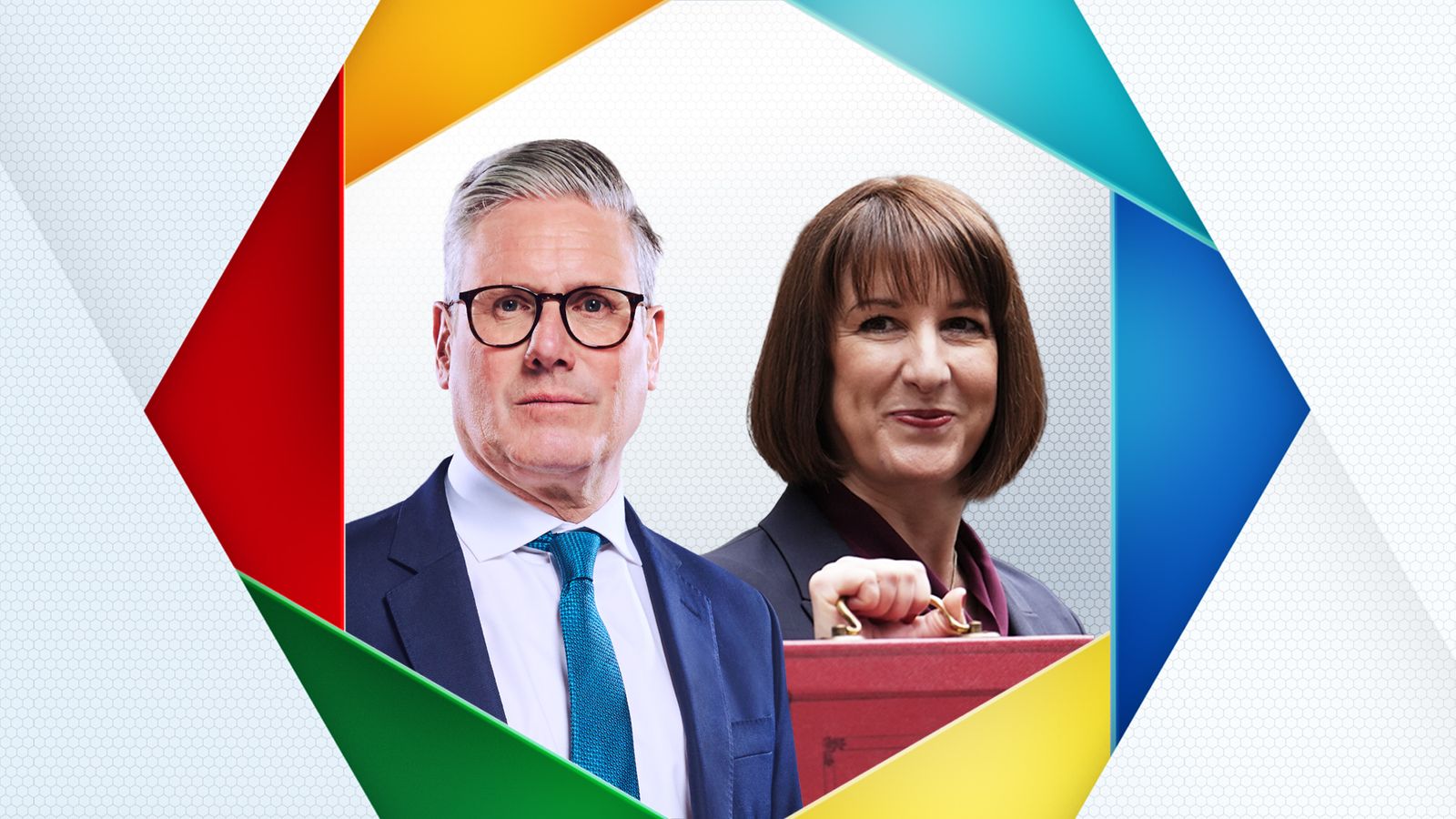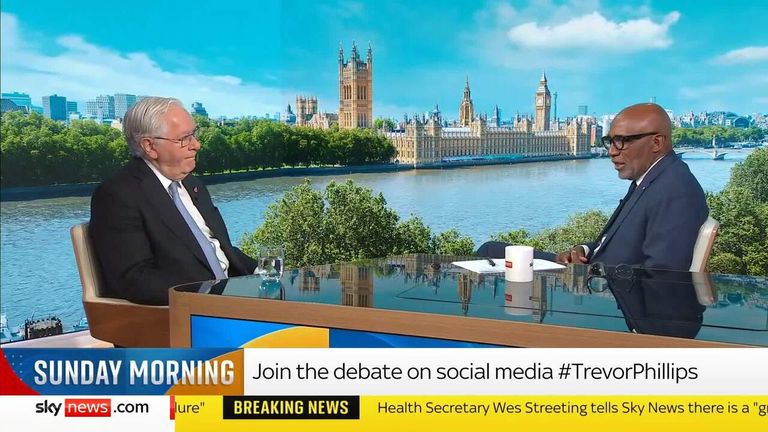The budget this week – what tax rises could Rachel Reeves announce?


Chancellor Rachel Reeves has promised to “grip the cost of living” in the budget – while also saving millions of pounds by raising taxes.
She and Prime Minister Sir Keir Starmer spent weeks laying the groundwork to break their manifesto promise not to raise income tax at the budget, but they will no longer do so.
Sky News understands ministers were working up a plan to lift the basic rate of income tax – perhaps by 2p – and then to simultaneously cut national insurance contributions for those on the basic rate of income tax.
But fearing a backlash from MPs and the public, that idea has been ditched, Sky’s Beth Rigby reports.
So what could actually be announced when Ms Reeves reveals the budget on Wednesday 26 November?
Income tax thresholds frozen
Sky News understands the chancellor is expected to freeze income tax thresholds for another two years beyond 2028, which should raise about £8bn.
As the Financial Times has reported, one option to raise revenue would involve cutting the thresholds at which people pay different rates of income tax, while leaving the headline basic and higher rates of the tax unchanged.
Pensions
Rumours about pension reforms crop up every year, with changes often not materialising. However, Ms Reeves is expected to cap tax-free salary sacrifices for pensions at £2,000 a year to raise £3bn, according to reports.
Staff putting away any more than that would have to pay the standard NI rate: 8% if they earn less than £50,000 and 2% above that.
Companies currently don’t have to pay the 15% employer national insurance tax on cash that goes into workers’ pensions.
A person earning more than £125,000 who sacrificed 20% could pay £460 more, while their employer could pay £3,450 more, according to accountancy firm RSM.
Please use Chrome browser for a more accessible video player

9:06
Minister on income tax U-turn
Those on lower salaries would face a much smaller hit. A worker earning £45,000 and sacrificing 5% would pay £30 more, while their employer would pay £34 more.
People earning between £100,000 and £125,140 could be affected the most, given they often use salary sacrifice schemes to sidestep a marginal tax rate of 60% and to keep lucrative child benefits.
The Treasury has already confirmed pensioners will see their state pensions rise by as much as £550 next year under the triple lock pledge, which means the state pension must rise by the highest of wage growth, inflation or 2.5%.
Inheritance tax
A lifetime cap on the value of gifts someone can pass on before they die has also been considered by the Treasury, it is reported.
Currently, there is no charge on gifts if the donor survives seven years but a cap – possibly about £100,000 – on how much people can give before they are taxed could be introduced.
Ms Reeves is also said to be considering extending the seven-year period before inheritance tax has to be paid to 10 years or even longer.
The taper relief rate (the tax discount for living at least three years after giving a gift) is understood to also be under review.
Please use Chrome browser for a more accessible video player

2:35
Rumours of inheritance tax U-turn
LLPs
The chancellor is reportedly considering imposing a charge on limited liability partnerships (LLP) to raise £2bn.
LLPs are used by about 190,000 people, including lawyers, GPs and accountants, to be considered self-employed, exempting them from employers’ national insurance.
VAT
Ms Reeves previously sparked rumours she is looking at raising VAT by refusing to rule it out.
Labour’s employers’ national insurance increase and putting VAT on private school fees has shown the government is not worried about workarounds to its promise to not raise taxes on “working people”.
She could end lower or zero rates for products such as food and children’s clothes.
The chancellor could also lower the starting threshold for businesses paying VAT – but tax experts say this risks increasing inflation.
Please use Chrome browser for a more accessible video player

2:03
Former Bank of England Governor Lord Mervyn King says the budget will be tough
Business rates
Legislation to change the business rates system is already due to come into force in April 2026.
The chancellor is expected to confirm the exact rates for each band at the budget, as well as provide further guidance on transitional relief and eligibility criteria.
Stamp duty and council tax
One of the first budget rumours came in August when The Guardian reported the Treasury was considering a new tax on the sale of homes worth more than £500,000 to replace stamp duty.
Under the proposal, sellers, instead of buyers, would be responsible for paying the tax.
Instead of a complete council tax overhaul, which was previously rumoured, the chancellor is said to be looking at a revaluation of properties in the highest council tax bands – F, G and H – which could mean they move up or down a band.
She is also reportedly looking at a surcharge for the most valuable homes (over £2m) at a cost of about £4,500 a year, although owners will be able to defer the payment until they sell or die.
Landlord national insurance
Rent is largely exempt from national insurance at the moment, but there are reports the chancellor is considering applying the same 8% rate as the self-employed on landlords’ rental profits.
This could raise about £2.3bn a year, The Times previously reported.
ISAs
Rumours surrounding the previous budget about cutting the annual tax-free cash ISA limit from £20,000 resurfaced in the summer and autumn.
The latest reports say the chancellor is considering cutting it to £12,000 in an attempt to get people to invest in stocks and shares ISAs instead – and therefore putting much of the £300bn held in cash ISAs into the stock market.
She is also looking at a “British ISA” scheme, where investors get an additional £5,000 tax-free allowance to put into UK-listed shares.
Fuel duty/EVs
There has been a freeze on fuel duty since 2011, while a 5p-per-litre cut from 2022 is to remain in place until March 2026.
But the chancellor could increase fuel duty by up to 3p per litre, according to some reports.
Electric vehicle drivers will be hit with a pay-per-mile tax, The Telegraph reported on 6 November.
EV drivers will be charged 3p per mile on top of other road taxes from 2028, meaning an extra £250 a year, on average.
They will be asked to estimate how many miles they will take and charged on that, with no need for electronic monitors in cars, it is understood.
Van drivers will avoid the pay-per-mile tax but plug-in hybrid cars will be included so will pay both that tax and fuel duty, The Times reports.
The chancellor is expected to extend the EV grant for another year.
Please use Chrome browser for a more accessible video player

2:20
Has Rachel Reeves changed her tone on the budget?
Cycle to Work scheme
A cap on how much someone can spend on a bike through the Cycle to Work scheme is expected, the Financial Times reports.
The scheme allows people to save tax on bikes by “loaning” them from their employers, with payments automatically deducted from their salary pre-tax. There is currently no cap on how much a bike can cost.
Two-child benefit cap
Ms Reeves is expected to lift the two-child benefit cap, which has limited parents from claiming child tax credit or universal credit for more than two children since 2017.
The move, which will be welcomed by many Labour MPs, will cost the government £3bn.
Crackdown on benefits fraud
An extension of the Targeted Case Reviews taskforce, which clamps down on inaccurate universal credit claims, is expected in the hope of saving £1.2bn by March 2031.
Last year, a record £6.5bn was lost to universal credit fraud, National Audit Office analysis of government data showed.
Motability
The chancellor had been considering tightening the eligibility criteria for the Motability scheme, which provides a disability allowance to lease cars, scooters or powered wheelchairs.
It could have saved taxpayers £1bn, but social security minister Sir Stephen Timms said on 27 October there will be no changes until next year.
Wealth tax
There has been an increasing number of calls for a wealth tax, which could be an annual charge on those with assets exceeding a certain threshold or a 20% exit tax on the unrealised capital gains of wealthy people leaving Britain.
However, the government has stated neither option is currently under consideration, especially over fear of an exodus of millionaires.
Please use Chrome browser for a more accessible video player

4:17
Chancellor faces tough budget choices
Mansion tax
The chancellor is understood to be looking at an annual 1% charge on the amount a property’s value exceeds £2m – a £10,000-a-year levy for homes worth £3m.
Another proposal would see capital gains tax (CGT) charged when someone sells their main home, based on the amount it has increased in value during ownership.
Reports suggest this would only be applied to the most expensive properties, with a possible threshold of £1.5m, which would affect about 120,000 homeowners and higher-rate taxpayers getting CGT bills of nearly £200,000.
Energy bills
A Treasury spokesman said in October that action to bring down energy prices is among the options being considered at the budget.
Ms Reeves is understood to be considering cutting the 5% VAT rate on bills to zero, a move that would save billpayers about £80 a year and cost £2.5bn to implement.
Gambling tax
The Institute for Public Policy Research (IPPR) thinktank has said increasing gambling taxes would earn the Treasury about £3.2bn extra a year.
Gordon Brown has backed calls for a new tax on profits made by online casinos, slot machines and other high-stakes betting firms.
Tourism tax
The chancellor is expected to announce cities across England can impose a tourist levy on visitors staying overnight. Levies are already coming in Scotland and Wales.
However, it is now expected she will not do this in the budget but through the English Devolution and Community Empowerment Bill, currently going through parliament, which will give regional mayors the power to impose a tourist tax.
London mayor Sir Sadiq Khan has cautiously welcomed the reports, with the Greater London Authority previously estimating a £1 a day levy could raise £91m, and a 5% levy could raise £240m.
Taxi tax
The chancellor is reportedly considering adding VAT to all private hire vehicle journeys, which could increase costs by up to 15% to raise about £750m – although the taxi industry disputes how much it would raise.
At present, VAT is only charged on the profit firms take, rather than the fare itself.
Milkshake tax
Ms Reeves is expected to confirm an end to the sugar tax exemption on milk-based drinks.
Additional reporting by Dylan Donnelly